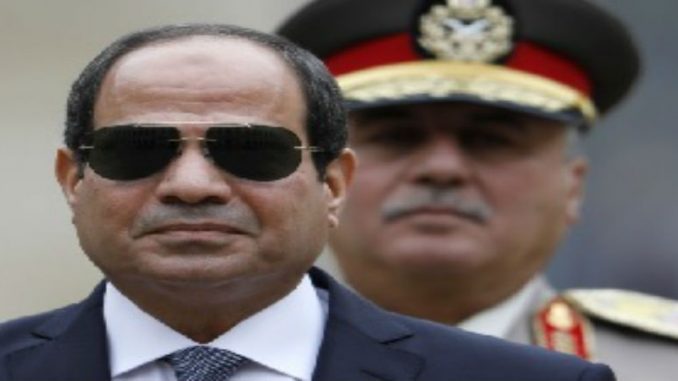
Chinese president Xi Jinping discarded term limits and is preparing to rule for life like an emperor of old. Egyptian president Abdel Fattah el-Sisi is preparing to follow Xi’s example as his supporters propose similarly amending the constitution and allowing him to become a modern pharaoh, according to a report by The National Interest.
Five years ago General el-Sisi staged a coup, arrested the elected president, Mohamed Morsi, killed hundreds of pro-Morsi demonstrators, and jailed tens of thousands of opponents, critics and demonstrators. Having suppressed all serious opposition, el-Sisi took over as president and in 2014 staged a faux election, winning more than 97 percent of the vote over minor opposition, said Doug Bandow in his report.
El-Sisi staged an electoral repeat in March. This time several would-be opponents, including with military backgrounds, sought to oppose him, but he arrested or intimidated them all. For instance, Abdel Moniem Aboul Fotouh, a 2012 presidential candidate, was detailed along with fifteen party members and placed on the official terrorism list. Sami Anan, el-Sisi’s predecessor as army chief of staff, was arrested, and a top member of his campaign, Hisham Geneina, el-Sisi’s former anti-corruption chief, was sentenced to five years in prison.
This process winnowed the opposition field to a self-professed supporter, who said he was “not here to challenge the president” (and was pushed into the race by el-Sisi’s minions). Of course, the Egyptian president denied any connection to the remarkable string of bad luck which afflicted his potential opponents. His spokesman said that “neither Sisi’s morals nor his dignity let him prevent any other person from running.”
El-Sisi abandoned the pretense of a free vote not because he might lose—his officials would be counting the votes, after all—but to prevent even a small split within the military and development of any political opposition. Unsurprisingly, el-Sisi again took an enviable 97 percent of the vote. However, despite the regime threatening fines, job loss, police raids, and more for those who failed to vote and promising benefits including bribes, financial prizes, trips, food, and community grants and projects for those who did, total turnout was just 41 percent, down six points from the previous poll. Seven percent of ballots cast were spoiled. A website republished a New York Times article on the government’s election machinations, only to be fined and closed.
Thus have ended the hopes and dreams surrounding the 2011 revolution.
There was much to criticize about the brief presidency of Islamist Mohamed Morsi elected in 2012, but he was no tyrant. To the contrary, he failed to control the bureaucracy, police, or military. Antagonistic businessmen sought to create economic chaos. The police refused to protect his party’s headquarters from a mob. He was ousted after Saudi Arabia funded street protests and promised aid to el-Sisi if the latter seized control. The revolutionary regime that was supposed to liberate Egypt morphed into the dictatorship that it had replaced, just like in George Orwell’s Animal Farm.
Freedom House rates Egypt as not free, near the bottom on both political rights and civil liberties. The group’s latest report explained: “Serious political opposition is virtually nonexistent, as both liberal and Islamist activists face criminal prosecution and imprisonment. Terrorism persists unabated in the Sinai Peninsula and has also struck the Egyptian mainland, despite the government’s use of aggressive and often abusive tactics to combat it.”
Egypt’s civil liberties rating dropped “due to the approval of a restrictive law on nongovernmental organizations and a crackdown on activity by labor unions that are not recognized by the government.” Only government-controlled unions were recognized by the government and last December a new law dissolved all independent ones. NGOs also “have faced mass closures as well as harassment in the form of office raids, arrests of members, lengthy legal cases, and restrictions on travel.” Unsurprisingly, the “media sector is dominated by progovernment outlets, as most critical or opposition-oriented outlets were shut down in the wake of the coup.”
Little is private or protected. Explained Freedom House: “The security services have reportedly upgraded their surveillance equipment and techniques in recent years so as to better monitor social media platforms and mobile phone applications. Pro-government media figures and state officials regularly call for national unity and suggest that only enemies of the state would criticize the authorities. These pressures have led to more self-censorship and guarded discussion among ordinary Egyptians.”
The political system is rigged. Minorities face discrimination that prevents them from even the limited political participation of the general population. But as the latest presidential vote demonstrated, politics is only for show. Freedom House noted that el-Sisi “has ruled in a style that entrenches military privilege and shields the armed forces from accountability for their actions.” At the same time, “corruption is pervasive at all levels of government.”
There is no system of justice. The government extended its control over the courts. Moreover, explained Freedom House: “A series of mass trials in recent years have resulted in harsh sentences, including life imprisonment or the death penalty, based on negligible evidence.” Additionally, thousands of civilians have been sent to military courts for conviction, er, “trial.”
Amnesty International’s 2017–2018 report is equally negative. Among the highlights, human-rights NGOs were silenced, freedom of assembly and expression was denied, arbitrary arrests and detentions were common, extrajudicial disappearances and executions were standard operating procedure, trials were unfair, freedom of labor and religion were denied, and much more.



